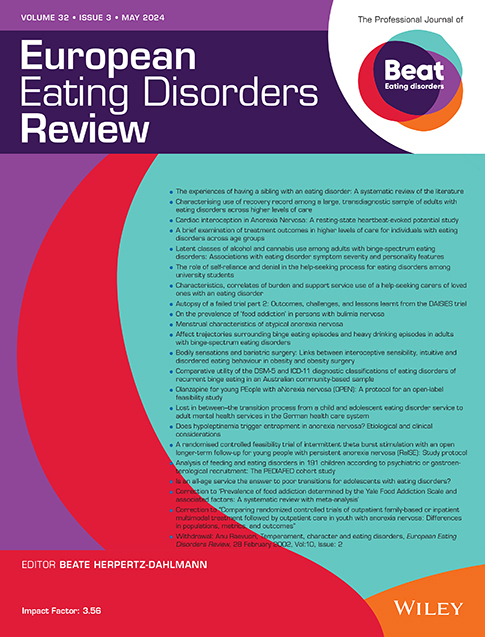Adolescent Girls With Anorexia Nervosa Clinical Profiles in Relation to Their Social Networks Use
Abstract
Background
In recent years, social networks (SNs) have increasingly become a core activity adolescent's daily life. Their impact on mental health is an actual worldwide concern. This massive usage of social network has been suggested to increase the risk of depressive and anxiety disorders, as well as alterations in sleep quality and quantity. In particular, it has been suggested that it could increase concerns about body image and thereby encourage eating disorders. Aiming at further investigating these relations, this study examined, for the first time, the links between the clinical profile of adolescents with anorexia nervosa and SNs use patterns.
Methods
The sample included 131 adolescent girls with anorexia nervosa who completed an online survey assessing their SNs practices in terms of duration, intensity and function of SNs use, misuse and addictive tendencies, as well as the number of online peers. Clinical characteristics such as eating behaviours, body image perception, depression, anxiety and sleep quality were also assessed.
Results
showed that adolescents with anorexia nervosa spend more than 3 h per day on SNs. Those spending 5 h per day or more preferred a passive use, with limited connection with peers and greater clinical difficulties. In addition, high problematic use of SNs significantly aggravated eating behaviour, dysmorphophobia, depressive symptoms and sleep impairment. The activities performed on SNs were not significantly associated with variations in clinical characteristics.
Conclusion
Presents findings suggests that a profile of social networking marked by a problematic, prolonged and passive use, is associated with more severe symptomatology in adolescent girls with anorexia nervosa. These first data could inspire professionals to encourage a SNs use favouring care and recovery, thereby supporting adolescents with an eating disorder but also their relatives.


 求助内容:
求助内容: 应助结果提醒方式:
应助结果提醒方式:


